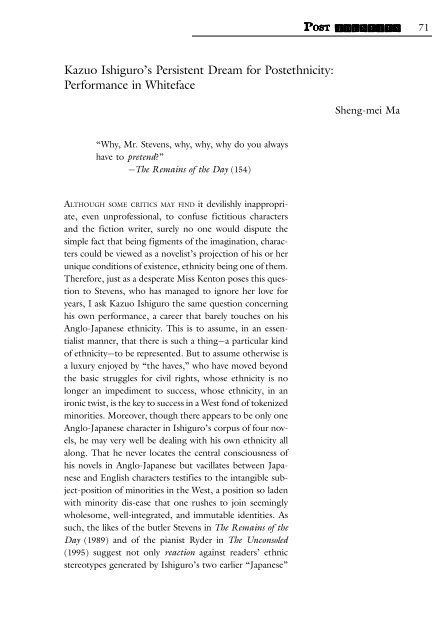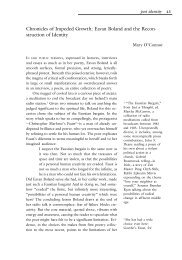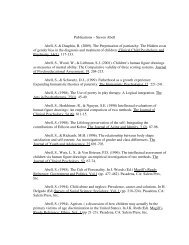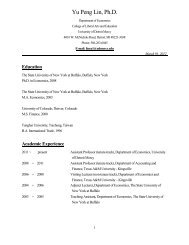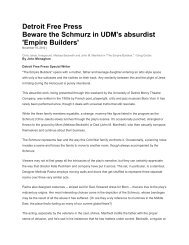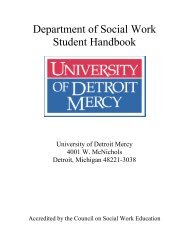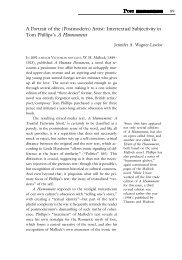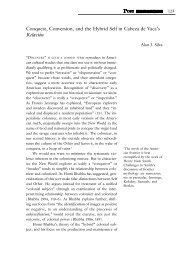Kazuo Ishiguro's Persistent Dream for Postethnicity: Performance in ...
Kazuo Ishiguro's Persistent Dream for Postethnicity: Performance in ...
Kazuo Ishiguro's Persistent Dream for Postethnicity: Performance in ...
You also want an ePaper? Increase the reach of your titles
YUMPU automatically turns print PDFs into web optimized ePapers that Google loves.
<strong>Kazuo</strong> Ishiguro’s <strong>Persistent</strong> <strong>Dream</strong> <strong>for</strong> <strong>Postethnicity</strong>:<br />
Per<strong>for</strong>mance <strong>in</strong> Whiteface<br />
“Why, Mr. Stevens, why, why, why do you always<br />
have to pretend?”<br />
—The Rema<strong>in</strong>s of the Day (154)<br />
ALTHOUGH SOME CRITICS MAY FIND it devilishly <strong>in</strong>appropriate,<br />
even unprofessional, to confuse fictitious characters<br />
and the fiction writer, surely no one would dispute the<br />
simple fact that be<strong>in</strong>g figments of the imag<strong>in</strong>ation, characters<br />
could be viewed as a novelist’s projection of his or her<br />
unique conditions of existence, ethnicity be<strong>in</strong>g one of them.<br />
There<strong>for</strong>e, just as a desperate Miss Kenton poses this question<br />
to Stevens, who has managed to ignore her love <strong>for</strong><br />
years, I ask <strong>Kazuo</strong> Ishiguro the same question concern<strong>in</strong>g<br />
his own per<strong>for</strong>mance, a career that barely touches on his<br />
Anglo-Japanese ethnicity. This is to assume, <strong>in</strong> an essentialist<br />
manner, that there is such a th<strong>in</strong>g—a particular k<strong>in</strong>d<br />
of ethnicity—to be represented. But to assume otherwise is<br />
a luxury enjoyed by “the haves,” who have moved beyond<br />
the basic struggles <strong>for</strong> civil rights, whose ethnicity is no<br />
longer an impediment to success, whose ethnicity, <strong>in</strong> an<br />
ironic twist, is the key to success <strong>in</strong> a West fond of tokenized<br />
m<strong>in</strong>orities. Moreover, though there appears to be only one<br />
Anglo-Japanese character <strong>in</strong> Ishiguro’s corpus of four novels,<br />
he may very well be deal<strong>in</strong>g with his own ethnicity all<br />
along. That he never locates the central consciousness of<br />
his novels <strong>in</strong> Anglo-Japanese but vacillates between Japanese<br />
and English characters testifies to the <strong>in</strong>tangible subject-position<br />
of m<strong>in</strong>orities <strong>in</strong> the West, a position so laden<br />
with m<strong>in</strong>ority dis-ease that one rushes to jo<strong>in</strong> seem<strong>in</strong>gly<br />
wholesome, well-<strong>in</strong>tegrated, and immutable identities. As<br />
such, the likes of the butler Stevens <strong>in</strong> The Rema<strong>in</strong>s of the<br />
Day (1989) and of the pianist Ryder <strong>in</strong> The Unconsoled<br />
(1995) suggest not only reaction aga<strong>in</strong>st readers’ ethnic<br />
stereotypes generated by Ishiguro’s two earlier “Japanese”<br />
POST OST IDENTITY IDENTITY 71<br />
Sheng-mei Ma
72 POST OST IDENTITY<br />
IDENTITY<br />
1 See Ishiguro’s <strong>in</strong>terview<br />
with Vorda and<br />
novels, but reactionary cooptation <strong>in</strong>to a dream world of<br />
postethnicity. The m<strong>in</strong>ority complex over how one’s differences<br />
are be<strong>in</strong>g perceived and received by others is projected<br />
by Ishiguro onto the majority, specifically Stevens<br />
and Ryder, whose professions consist of public per<strong>for</strong>mances<br />
which put private selves under erasure. Yet the suppression<br />
of ethnicity, as any suppression goes, is attended by tremendous<br />
tension, which <strong>in</strong> turn is cloaked by the <strong>in</strong>creas<strong>in</strong>g<br />
stylization of Ishiguro’s four books. Stylization seeks<br />
to generalize and ritualize, hence m<strong>in</strong>imiz<strong>in</strong>g <strong>in</strong>dividual<br />
variations. The behavior of a butler or of a renowned musician<br />
then proceeds <strong>in</strong> accordance with idealized social<br />
codes. While Ishiguro’s characters always suffer from concealment<br />
of secret lives, his English protagonists have grown<br />
obsessed with mannerisms and public personae. His characters’<br />
denial of emotions parallels a m<strong>in</strong>ority writer’s <strong>in</strong>nermost<br />
neurosis, a deep-seated anxiety over identity. In<br />
terms of language, the perfect, precise British English <strong>in</strong><br />
which every character speaks, Japanese <strong>in</strong>cluded, and with<br />
which every scene is laid out totalizes the novel, so much<br />
so that characters and scenes become no more than mouthpieces<br />
and backdrops <strong>for</strong> Ishiguro’s overarch<strong>in</strong>g concern<br />
<strong>for</strong> the human condition. Any commentary with so sweep<strong>in</strong>g<br />
a scope betrays a desire to exceed one’s limitations,<br />
such as ethnicity. It is worth not<strong>in</strong>g that all of his books<br />
explore the failure of such a desire.<br />
Subversive Whiteface<br />
React<strong>in</strong>g Aga<strong>in</strong>st Orientalism<br />
<strong>Kazuo</strong> Ishiguro’s career destabilizes one of the most press<strong>in</strong>g<br />
issues of our time—ethnicity, underscor<strong>in</strong>g at once its<br />
gravity and fleet<strong>in</strong>gness. Intr<strong>in</strong>sic merits of his novels aside,<br />
m<strong>in</strong>ority concerns <strong>in</strong> England and the <strong>in</strong>dustrialized First<br />
World <strong>in</strong> the 1980s catapult <strong>in</strong>to prom<strong>in</strong>ence the Ishiguro<br />
of the two “Japanese” novels—A Pale View of Hills (1982)<br />
and An Artist of the Float<strong>in</strong>g World (1986). Without the<br />
apparently ethnic themes and characters, without Ishiguro’s<br />
own Japanese name and face on the book covers, the novelist<br />
speculates <strong>in</strong> an <strong>in</strong>terview that he would have had a<br />
much tougher time break<strong>in</strong>g through. 1 However, Ishiguro’s<br />
ethnicity is attributed to him on the essentialist premises<br />
Sheng-mei Ma
of the Japanese culture he <strong>in</strong>herits from his family and the<br />
Japanese fictional universe he <strong>in</strong> turn creates. His third<br />
novel The Rema<strong>in</strong>s of the Day, by contrast, appears almost<br />
Conradian <strong>in</strong> its be<strong>in</strong>g more English than the English. As<br />
if taunt<strong>in</strong>g his readers’ assumption of race and ethnicity,<br />
Ishiguro conjures up an idealized England of the past decades<br />
from the eyes of a British butler, rather than those of<br />
Etsuko, the Japanese immigrant <strong>in</strong> the British Isles <strong>in</strong> Pale,<br />
or of Masuji Ono, the Japanese pa<strong>in</strong>ter <strong>in</strong> Japan <strong>in</strong> Artist.<br />
Indeed, Rema<strong>in</strong>s proceeds almost entirely devoid of any<br />
Asian reference, with the exception of the porcela<strong>in</strong><br />
Ch<strong>in</strong>aman adorn<strong>in</strong>g the staircase at Darl<strong>in</strong>gton Hall. The<br />
Unconsoled outdoes the de-ethnicized Rema<strong>in</strong>s by anchor<strong>in</strong>g<br />
itself <strong>in</strong> the dreams and nightmares, not even <strong>in</strong> the<br />
daytime <strong>in</strong>terior monologue, of an Englishman. An ethnic<br />
writer’s persistent desire <strong>for</strong> postethnicity is eventually realized<br />
<strong>in</strong> Unconsoled, cast, ironically, as a dream, one which<br />
emanates m<strong>in</strong>ority anxiety because it pretends to be its<br />
opposite—the majority. The very <strong>for</strong>m of Unconsoled suggests<br />
that postethnicity is a wish-fulfillment and that the<br />
derac<strong>in</strong>ated dreamscape a reaction aga<strong>in</strong>st Orientalist read<strong>in</strong>gs<br />
of his “Japanese” novels. But could it not be possible<br />
that Ishiguro’s ethnicity is as much an ideological construct<br />
of our own mak<strong>in</strong>g as postethnicity is of Ishiguro’s?<br />
Does it not stand to reason that the Japanese-ness perceived<br />
<strong>in</strong> the novelist <strong>in</strong> fact resembles the English-ness <strong>in</strong><br />
Stevens and <strong>in</strong> Ryder?<br />
Such mutual dream<strong>in</strong>g of fictitious characters, of fiction<br />
writers, and of fiction readers br<strong>in</strong>gs to m<strong>in</strong>d the Ch<strong>in</strong>ese<br />
philosopher Chuang-tzu (fifth to fourth-century B.C.)<br />
who “dreamt that he was a butterfly…Suddenly he awakened,<br />
and there he was, veritably Chuang Chou [Chou<br />
was his personal name] himself. Now he does not know<br />
whether the butterfly is a dream of Chuang Chou or<br />
whether Chuang Chou is a dream of the butterfly” (Liu<br />
41). Chuang-tzu problematizes the Self by shift<strong>in</strong>g subjectivity<br />
from the human to an <strong>in</strong>sect, hence to the entire<br />
world. But the fact that we attribute such erasure of Self to<br />
Chuang-tzu rather than to a butterfly highlights Chuangtzu’s<br />
personal philosophy. The abandonment of the Self<br />
can only derive from a Self strong enough to be aban-<br />
Sheng-mei Ma<br />
POST OST IDENTITY IDENTITY 73<br />
Herz<strong>in</strong>ger, especially pp.<br />
133–4.
74 POST OST IDENTITY<br />
IDENTITY<br />
2 See Vorda and<br />
Herz<strong>in</strong>ger, pp. 135–6.<br />
3 See Gregory Mason’s<br />
“Inspir<strong>in</strong>g Images” and<br />
his <strong>in</strong>terview of Ishiguro,<br />
p. 336. See also Vorda and<br />
Herz<strong>in</strong>ger, especially pp.<br />
147–8.<br />
doned. Similarly, Ishiguro’s Stevens and Ryder appear to<br />
be divorced from the author’s background, but they only<br />
materialize, like sculptures on a totem pole, on the shoulders<br />
of Etsuko and of Ono. Ishiguro’s persistent dream <strong>for</strong><br />
universalist parables beyond identity politics arises from<br />
his firm ground<strong>in</strong>g <strong>in</strong> the literary scene via his ethnic<br />
“stage.” <strong>Postethnicity</strong> seems to be an excess <strong>in</strong>dulged <strong>in</strong><br />
only by those who have already made it, partly by virtue of<br />
their ethnicity.<br />
To be fair to Ishiguro, the critical side of him <strong>in</strong> various<br />
published <strong>in</strong>terviews and colloquiums has vehemently<br />
resisted be<strong>in</strong>g categorized as an ethnic writer. He has cautioned<br />
aga<strong>in</strong>st the comparison with his contemporaries such<br />
as Salman Rushdie and Timothy Mo, two among many<br />
English writers of non-English descent. 2 He has repeatedly<br />
po<strong>in</strong>ted out the absurdity and racism of be<strong>in</strong>g associated<br />
with Japanese writers like Mishima and Tanizaki.<br />
Yasujiro Ozu is perhaps the only Japanese master to whom<br />
he regularly pays tribute. But he has credited not just Ozu’s<br />
post-war films of shom<strong>in</strong>-geki (domestic drama) but<br />
Chekhov’s plays <strong>for</strong> his dar<strong>in</strong>g experimentation <strong>in</strong> the sluggish<br />
movement or utter plotlessness of his stories. 3 Most<br />
significantly, he has emphasized his creative drive of shuttl<strong>in</strong>g<br />
between the specific and the metaphorical, between<br />
realism and allegory, between the matter-of-fact details and<br />
the universal. In other words, Ishiguro has <strong>in</strong>sisted throughout<br />
his career to be regarded as postethnic as well. Though<br />
never disavow<strong>in</strong>g the ethnic-specific nature of some of his<br />
works, he tirelessly br<strong>in</strong>gs up their universal aspect. It is<br />
<strong>in</strong>trigu<strong>in</strong>g to note that such persistence would culm<strong>in</strong>ate<br />
thus far <strong>in</strong> the surrealist Unconsoled, whose dreamscape<br />
evokes the modernist angst of Kafka, the surrealist pa<strong>in</strong>t<strong>in</strong>gs<br />
of Salvador Dali, the maze-like lithographs of M. C.<br />
Escher, and a host of other, <strong>for</strong> lack of a better term, “universalist<br />
aestheticians.” To be sure, scholars have explored,<br />
among other subjects, Kafka’s Jewish background and Dali’s<br />
roots <strong>in</strong> the devastation of the Great War. The fact rema<strong>in</strong>s,<br />
however, that these artists had opted <strong>for</strong> an artistic<br />
expression that was deliberately abstract and universal, supposedly<br />
above and beyond the mundane world which they<br />
critiqued. The three melted timepieces <strong>in</strong> the bleak waste-<br />
Sheng-mei Ma
land of Dali’s 1931 “The Persistence of Memory,” <strong>for</strong> <strong>in</strong>stance,<br />
try to deny memory but eerily revalidate it. Time is<br />
suspended, distance warped, <strong>in</strong>tentions thwarted, all of<br />
which echo perfectly the mood of Unconsoled. But by merely<br />
distort<strong>in</strong>g and not annihilat<strong>in</strong>g time, distance, and <strong>in</strong>tentions,<br />
Dali and Ishiguro <strong>in</strong> effect call attention to these<br />
mutations. Despite one’s attempt to undo memory, it returns<br />
with a greater <strong>for</strong>ce. The corpses of timepieces no<br />
longer tell the time; they haunt it. Each of Ishiguro’s protagonists<br />
is likewise locked <strong>in</strong> the prisonhouse of memory,<br />
the web of which constitutes and arrests the Self. All his<br />
male characters tried or cont<strong>in</strong>ue to try to rise above mediocrity,<br />
or the conf<strong>in</strong>es of the self, <strong>for</strong> the noble cause of<br />
ameliorat<strong>in</strong>g the human condition. Ono, Lord Darl<strong>in</strong>gton<br />
and his shadow, Stevens, and Ryder were once or still are<br />
trapped by delusions of grandeur, <strong>for</strong>ced <strong>in</strong> the end to<br />
confront the tragic consequences of their own actions. Their<br />
failure has a certa<strong>in</strong> tragic dignity to it, reflect<strong>in</strong>g Ishiguro’s<br />
own dream <strong>for</strong> transcend<strong>in</strong>g ethnicity.<br />
But be<strong>for</strong>e pronounc<strong>in</strong>g dead(end) the postethnic text<br />
of Unconsoled, we need to reassess exactly how his first two<br />
novels come to be characterized as “Japanese” and why<br />
Rema<strong>in</strong>s comes off as a huge success with its equally<br />
postethnic theme. Despite the universalist claims <strong>in</strong> his<br />
<strong>in</strong>terviews, Ishiguro’s first two books are thoroughly<br />
stamped with ethnic markers. Both Etsuko and Ono are<br />
cop<strong>in</strong>g with their personal transgressions deeply <strong>in</strong>tertw<strong>in</strong>ed<br />
with Japan’s recent past. Etsuko neglected and even abused<br />
her own daughter <strong>in</strong> the post-war Nagasaki, result<strong>in</strong>g <strong>in</strong><br />
the daughter’s alienation and eventual suicide <strong>in</strong> England. 4<br />
Ono dedicated his artistic talents to Japanese military expansionism,<br />
thus personally responsible <strong>for</strong> the disaster of<br />
World War II. Ishiguro, nevertheless, did not compose<br />
these stories solely from first-hand experiences of Japan.<br />
He left Nagasaki with his family <strong>for</strong> England <strong>in</strong> 1960 when<br />
he was five- or six-year-old. Images of homeland reta<strong>in</strong>ed<br />
by a young child are bound to be vague and limited, yet<br />
Ishiguro f<strong>in</strong>ds a way to capitalize on what is presumably a<br />
weakness <strong>in</strong> fiction writ<strong>in</strong>g. By hav<strong>in</strong>g his protagonists explore<br />
their shaky recall of the past, Ishiguro <strong>in</strong>geniously<br />
justifies the fuzz<strong>in</strong>ess of Japan <strong>in</strong> his own creative m<strong>in</strong>d.<br />
Sheng-mei Ma<br />
POST OST IDENTITY IDENTITY 75<br />
4 See Sheng-mei Ma’s<br />
“Immigrant Schizophrenic<br />
<strong>in</strong> Asian Diaspora Literature”<br />
<strong>in</strong> Immigrant<br />
Subjectivities <strong>in</strong> Asian<br />
American and Asian<br />
Diaspora Literatures<br />
(1998) <strong>for</strong> a close analysis.
76 POST OST IDENTITY<br />
IDENTITY<br />
Consequently, the hills near Nagasaki as well as the past<br />
associated with it, remembered by a guilt-ridden mother,<br />
become a “pale view” with <strong>in</strong>dist<strong>in</strong>ct outl<strong>in</strong>es. The retired<br />
pa<strong>in</strong>ter Ono, far more admirable than Etsuko <strong>in</strong> acknowledg<strong>in</strong>g<br />
his mistakes, rambles on, apparently <strong>in</strong>discrim<strong>in</strong>ately,<br />
about a world <strong>in</strong> constant flux. Despite the appearance of<br />
sharp rifts <strong>in</strong> his own career and <strong>in</strong> Japan’s history, the<br />
novel is an amaz<strong>in</strong>gly coherent jumble of images and<br />
sounds, one <strong>in</strong>terweav<strong>in</strong>g <strong>in</strong>to the other to <strong>for</strong>mulate a<br />
complete lifestory, a mosaic of sorts of muted tones and<br />
smudged contours. Ono’s “flow” through an ever-chang<strong>in</strong>g<br />
world comes through <strong>in</strong> the thematic repetitions of<br />
betrayals. The young artistic Ono rebels aga<strong>in</strong>st his bus<strong>in</strong>essman<br />
father by jo<strong>in</strong><strong>in</strong>g an art company that mass produces<br />
Orientalist kitsch <strong>for</strong> <strong>for</strong>eign consumption. But such<br />
a revolt cont<strong>in</strong>ues the family tradition of merchantilism.<br />
Ono subsequently deserts art-as-a-bus<strong>in</strong>ess <strong>for</strong> Mori-san’s<br />
art-<strong>for</strong>-art’s-sake, <strong>in</strong>dulg<strong>in</strong>g himself <strong>in</strong> the ephemeral “Pleasure<br />
District.” Awakened by patriotism and social concerns,<br />
Ono abandons his sensei’s pr<strong>in</strong>ciples and unwitt<strong>in</strong>gly jo<strong>in</strong>s<br />
the fascist militarists. In this process, he betrays to the<br />
authorities his own less royalist disciple, Kuroda, who languishes<br />
<strong>in</strong> prison dur<strong>in</strong>g the war. It is significant that both<br />
the part<strong>in</strong>gs with Mori-san and with Kuroda are set <strong>in</strong> the<br />
same pavilion, accentuat<strong>in</strong>g the pattern of repetition <strong>in</strong> his<br />
life. In fact, <strong>in</strong> his old age, Ono <strong>in</strong>creas<strong>in</strong>gly speaks and<br />
th<strong>in</strong>ks like Mori-san, whom he discredited <strong>in</strong> his youth.<br />
The antagonism Kuroda’s student, Enchi, exhibits toward<br />
Ono parallels Ono’s earlier resentment aga<strong>in</strong>st Mori-san.<br />
It is <strong>in</strong> such duplications of events with<strong>in</strong> a vaguely<br />
ethnic context that one must see the k<strong>in</strong>dl<strong>in</strong>g of the<br />
postethnic impulse, <strong>for</strong> repetitions signal a general condition<br />
rather than unique characteristics. Indeed, Ishiguro,<br />
<strong>for</strong> autobiographical reasons, could not af<strong>for</strong>d to be otherwise.<br />
Part of him is English, even <strong>in</strong>ternational, and decidedly<br />
un-Japanese. He seeks to extricate himself from identity<br />
politics by means of not only the recurr<strong>in</strong>g events <strong>in</strong><br />
Ono’s life but by hav<strong>in</strong>g characters like Ono resurrected as<br />
a British lord, a butler, and a pianist, not to mention his<br />
previous re<strong>in</strong>carnation <strong>in</strong> the father-<strong>in</strong>-law, the equally nationalist<br />
Ogata-san, <strong>in</strong> Pale. What Ono experiences re-<br />
Sheng-mei Ma
sembles what many characters undergo, regardless of racial<br />
difference. In addition to the str<strong>in</strong>g of ag<strong>in</strong>g, self-deluded<br />
males, young boys likewise take after one another. The<br />
spoiled, wh<strong>in</strong>y Japanese boy Akira of Pale f<strong>in</strong>ds his own<br />
mirror image <strong>in</strong> the grandson Ichiro of Artist, subsequently<br />
trans<strong>for</strong>med <strong>in</strong>to the overweight, sulky Boris of Unconsoled.<br />
Characters are carry-overs from one book to the next because<br />
the fundamental human emotions explored through<br />
them are identical, namely, that of an unconsolable guilt<br />
and empt<strong>in</strong>ess. Despite Etsuko’s whitewash<strong>in</strong>g of her past,<br />
despite Ono’s courage and good will toward the new Japan,<br />
despite Stevens’s brac<strong>in</strong>g <strong>for</strong> the rema<strong>in</strong>s of his days,<br />
despite Ryder’s keep<strong>in</strong>g up of appearances, their lives are<br />
revealed to be irrevocably void of human warmth. To some<br />
extent, this preoccupation with the shared human condition<br />
accounts <strong>for</strong> some reviewers’ compla<strong>in</strong>t of the lack of<br />
<strong>in</strong>dividuality <strong>in</strong> Ishiguro’s characters, who are likened, rather<br />
mean-spiritedly by Louis Menand, to “papier-mache animations”<br />
(3) operat<strong>in</strong>g accord<strong>in</strong>g to some technical manual<br />
on gradations of human emotions.<br />
This thematic refra<strong>in</strong> culm<strong>in</strong>ates and <strong>in</strong>tensifies <strong>in</strong><br />
Ishiguro’s most recent novel, a refra<strong>in</strong> that so irritates certa<strong>in</strong><br />
reviewers that they parody the title as “uncontrolled,”<br />
“unrelent<strong>in</strong>g.” Jeff Giles describes it as “dull, repetitious,<br />
long-w<strong>in</strong>ded, long-w<strong>in</strong>ded, repetitious, dull…It’s as if he<br />
got sick of read<strong>in</strong>g about how compact his prose is—how<br />
he’s the poet laureate of the unspoken and the unexpressed—and<br />
suddenly retaliated with his dense snowstorm<br />
of words” (92F). Will Blythe agrees that “fatigue sets <strong>in</strong><br />
because The Unconsoled is curiously one-dimensional…The<br />
novel successfully embodies the dream logic of the unconscious,<br />
but that seems to be all it does” (65). This damn<strong>in</strong>g<br />
assessment is echoed by Ned Rorem: “The situation, a<br />
bad dream from which Ryder will never awake, is Kafka <strong>in</strong><br />
reverse…But at least Kafka is concise and visionary, whereas<br />
Ishiguro is directionless and undifferentiated” (157). Other<br />
reviewers see this, nevertheless, as an accomplishment. Tom<br />
Wilhelmus ma<strong>in</strong>ta<strong>in</strong>s that “Ishiguro has created a monument<br />
to boredom, accident, <strong>in</strong>difference, obtuseness, pretension,<br />
and misunderstand<strong>in</strong>g—a great negative adventure<br />
that is at once darkly humorous and a strik<strong>in</strong>g moral<br />
Sheng-mei Ma<br />
POST OST IDENTITY IDENTITY 77
78 POST OST IDENTITY<br />
IDENTITY<br />
commentary…The effect is Kafkaesque, a swirl<strong>in</strong>g mixture<br />
of <strong>in</strong>explicable guilt and dislocation <strong>in</strong> time” (322). Francis<br />
Wyndham likewise reports that the book is “not easy to<br />
read, but, surpris<strong>in</strong>gly, its overall effect does conta<strong>in</strong> an<br />
element of consolation. The muddle, panic, embarrassment,<br />
and dread that surface <strong>in</strong> our secret dreams do also, needless<br />
to say, feature <strong>in</strong> our daytime lives, and it is some<br />
com<strong>for</strong>t to be rem<strong>in</strong>ded by Ishiguro that they are universal”<br />
(94).<br />
If one disregard the differences of op<strong>in</strong>ion <strong>in</strong> these reviews<br />
and focus <strong>in</strong>stead on the evolution of Ishiguro’s<br />
postethnic concerns, then the novelist has largely succeeded.<br />
To contextualize Unconsoled, reviewers draw from Kafka,<br />
Lewis Carroll, Luis Bunuel, and no longer Mishima,<br />
Tanizaki, Ozu. It is perhaps not surpris<strong>in</strong>g that Rema<strong>in</strong>s<br />
and Unconsoled, their shared postethnic world notwithstand<strong>in</strong>g,<br />
would elicit such different responses, with reviewers<br />
overwhelm<strong>in</strong>gly <strong>in</strong> favor of the <strong>for</strong>mer. Rema<strong>in</strong>s<br />
won the Booker Prize <strong>in</strong> 1989 and was turned <strong>in</strong>to a Merchant-Ivory<br />
film starr<strong>in</strong>g Anthony Hopk<strong>in</strong>s and Emma<br />
Thompson. Evidently, the realistic Rema<strong>in</strong>s proves to be a<br />
far less disorient<strong>in</strong>g read than its surrealistic successor. The<br />
irony is that whereas the England of Rema<strong>in</strong>s may appear<br />
to exist com<strong>for</strong>tably <strong>in</strong> time, the book’s appeal stems from<br />
the public’s nostalgia <strong>for</strong> a bygone era imag<strong>in</strong>ed to have<br />
existed. On the other hand, though the restless nightmares<br />
of Unconsoled seem to occur outside time, they <strong>in</strong> effect<br />
reflect much of the reader’s life experiences—a colossal exercise<br />
<strong>in</strong> futility, anticipation followed, almost without fail,<br />
by disenchantment. Ultimately, it may be the lack of anchor<strong>in</strong>g<br />
or contextualiz<strong>in</strong>g <strong>in</strong> Unconsoled, which is of course<br />
Ishiguro’s whole po<strong>in</strong>t, that dooms the novel. And yet,<br />
one can argue that it is precisely because Ishiguro moors<br />
his book too securely <strong>in</strong> life that the reader refuses to endorse<br />
the vision of “Horror! Horror!” The circular, cont<strong>in</strong>uously<br />
frustrated motion of Ryder’s it<strong>in</strong>erary, or the<br />
lack thereof, rem<strong>in</strong>ds the reader, rather disturb<strong>in</strong>gly, of M.<br />
C. Escher’s 1951 “House of Stairs,” where <strong>in</strong>terconnected<br />
flights of stairs lead <strong>in</strong>to one another, on which crawl and<br />
roll centipedes, Sisyphuses labotomized and robbed of even<br />
the consolation of existentialism. Ishiguro’s expression is<br />
Sheng-mei Ma
understandably even more difficult <strong>for</strong> the public to accept<br />
than that of Escher’s lithograph or, <strong>for</strong> that matter, Kafka’s<br />
“Metamorphosis.” Whereas his predecessors cast their commentaries<br />
<strong>in</strong> explicitly allegorical terms, those of centipedes<br />
or a beetle, Ishiguro never deviates from the human world<br />
and never provides any sense of <strong>in</strong>sulation. Ishiguro gives,<br />
<strong>in</strong> the words of Carlton Lake <strong>in</strong> description of Dali’s “paranoic-critical<br />
method,” “the most <strong>in</strong>congruous or unbelievable<br />
material such detail and precision that it acquired,<br />
<strong>in</strong> the process, a life of its own and became almost plausible”<br />
(68–9). What dooms the reception of his novel may<br />
well be that the “detail and precision” is such that it becomes<br />
too plausibly the reader’s own life.<br />
Reactionary Whiteface Subsum<strong>in</strong>g Differences<br />
Yet neither Rema<strong>in</strong>s nor Unconsoled is truly postethnic.<br />
The English-ness of Stevens and Ryder is, <strong>in</strong> theory if not<br />
<strong>in</strong> practice, just as ethnic as the Japanese-ness of Etsuko<br />
and Ono. That one could only claim this on the theoretical<br />
plane bears witness to the grow<strong>in</strong>g realization, best<br />
embodied <strong>in</strong> George Lipsitz’s essay “The Possessive Investment<br />
<strong>in</strong> Whiteness,” that whiteness has long rema<strong>in</strong>ed<br />
<strong>in</strong>visible <strong>in</strong>, and thus beyond, racial discourse. This <strong>in</strong>visibility<br />
derives from the whites’ majority status and their<br />
control of discourse and material resources. The ethnic<br />
group <strong>in</strong> power is usually less <strong>in</strong>cl<strong>in</strong>ed to exam<strong>in</strong>e the correlation<br />
between its race and its power. There<strong>for</strong>e, Ishiguro’s<br />
shift to English characters and postethnicity may suggest<br />
problematics much more troubl<strong>in</strong>g than a m<strong>in</strong>ority’s reaction<br />
aga<strong>in</strong>st identity politics pigeonhol<strong>in</strong>g him as noth<strong>in</strong>g<br />
but an Anglo-Japanese. Ethnic writers can conceivably<br />
imag<strong>in</strong>e ways to become more, not less, ethnic. Why does<br />
ethnicity have to make way <strong>for</strong> postethnicity, an illegitimate<br />
heir probably one’s own yet alarm<strong>in</strong>gly white? Why<br />
should the ethnic community accept one writer’s flirtations<br />
with postethnicity, perhaps a code word <strong>for</strong> “whiteness”?<br />
One hastens to add that it is undoubtedly subversive<br />
<strong>for</strong> a m<strong>in</strong>ority to per<strong>for</strong>m <strong>in</strong> whiteface. Given the long<br />
history of blackface m<strong>in</strong>strelsy <strong>in</strong> North America and its<br />
permutations <strong>in</strong> Europe, it is hearten<strong>in</strong>g to see an Anglo-<br />
Sheng-mei Ma<br />
POST OST IDENTITY IDENTITY 79
80 POST OST IDENTITY<br />
IDENTITY<br />
5 See Rog<strong>in</strong>’s Blackface,<br />
White Noise: Jewish<br />
Immigrant <strong>in</strong> the Hollywood<br />
Melt<strong>in</strong>g Pot.<br />
Japanese assumes whiteface. More specifically, given the<br />
Fu Manchus, the Charlie Chans, the Madame Butterflies,<br />
the Dragon Ladies, and other stereotypical Asian characters<br />
impersonated by whites, Ishiguro has rendered an<br />
<strong>in</strong>valuable service <strong>in</strong> expand<strong>in</strong>g the repertoire of imag<strong>in</strong>ation<br />
<strong>for</strong> m<strong>in</strong>orities of Asian descent. This potentially revolutionary<br />
act, however, is compromised by the fact that<br />
the 1990s’ postethnic bent is so removed from the<br />
utopianism and activism of previous decades that it has<br />
acquired a color-bl<strong>in</strong>d, postmodernist flatness that is tantamount<br />
to bl<strong>in</strong>dness itself. If one were to take Ryder’s<br />
English-ness as the signifier of postethnicity, or <strong>in</strong> Ishiguro’s<br />
own phrase, of universal parable, the novelist is then caught<br />
<strong>in</strong> a double b<strong>in</strong>d: his reaction aga<strong>in</strong>st Orientalism has turned<br />
reactionary by subsum<strong>in</strong>g racial differences. To defy<br />
Orientalist characteristics imposed on him, Ishiguro passes<br />
as white. Fundamentally a per<strong>for</strong>mance on stage or <strong>in</strong> real<br />
life, such pass<strong>in</strong>g can be undertaken by all sides of a multiracial<br />
society. But the multi-directional pass<strong>in</strong>g does not<br />
betoken an egalitarian society; rather, it reflects how slanted<br />
the socio-economic relationship is. When Al Jolson, Eddie<br />
Cantor, Mickey Rooney, and others—many of whom Jewish<br />
and Irish—per<strong>for</strong>m <strong>in</strong> blackface, they do so to enterta<strong>in</strong><br />
the white audience, often at the expense of African American<br />
images. 5 When Charles W. Chesnutt writes about blacks<br />
pass<strong>in</strong>g <strong>for</strong> whites, blacks conceal their race to obta<strong>in</strong> better<br />
opportunities <strong>in</strong> a white-dom<strong>in</strong>ated society. Pass<strong>in</strong>g <strong>for</strong><br />
m<strong>in</strong>orities has historically meant a precarious passage <strong>in</strong>to<br />
a semblance of power.<br />
To further explore the temptation of pass<strong>in</strong>g <strong>for</strong> m<strong>in</strong>orities,<br />
I draw from Jennifer DeVere Brody <strong>in</strong> “Hyphen-<br />
Nations”:<br />
[T]he hyphen per<strong>for</strong>ms—it is never neutral or natural.<br />
Indeed, by per<strong>for</strong>m<strong>in</strong>g the mid-po<strong>in</strong>t between<br />
often conflict<strong>in</strong>g categories, hyphens occupy ‘impossible’<br />
positions….Hyphens are problematic because<br />
they cannot stand alone: <strong>in</strong> fact, they do not<br />
‘stand’ at all; rather, they mark a de-centered if<br />
central position that perpetually presents readers<br />
with a neither/nor proposition. Hyphens locate<br />
<strong>in</strong>termediate, often <strong>in</strong>visible, and always shift<strong>in</strong>g<br />
Sheng-mei Ma
spaces between supposedly oppositional b<strong>in</strong>ary<br />
structures. (149)<br />
Despite Brody’s somewhat negative description of hyphenated<br />
identity, one lack<strong>in</strong>g <strong>in</strong> subjectivity, her argument<br />
unveils the seem<strong>in</strong>gly <strong>in</strong>significant yet richly ambiguous<br />
hyphens. The destabiliz<strong>in</strong>g of race and ethnicity can <strong>in</strong>deed<br />
germ<strong>in</strong>ate from the sliver of space between races, a<br />
void belong<strong>in</strong>g to neither, a moment pregnant with <strong>in</strong>f<strong>in</strong>ite<br />
possibilities. If attributes supposedly <strong>in</strong>nate to one race<br />
can be faked by hyphenated, hybridized <strong>in</strong>dividuals, then<br />
the <strong>in</strong>tr<strong>in</strong>sic-ness of those attributes is subject to question.<br />
Racial pass<strong>in</strong>g thus highlights how an exterior display rather<br />
than some immutable “essence” lies at the heart of the<br />
construct of race. In the same deconstructive spirit, Judith<br />
Butler’s Gender Trouble (1990) views gender as a series of<br />
public acts. Yet unlike homosexuality which could choose<br />
to rema<strong>in</strong> closeted or to “come out,” ethnicity, except <strong>in</strong><br />
the case of mixed-blood, can never mask itself.<br />
Fiction, of course, is someth<strong>in</strong>g else. Ishiguro has so<br />
far masqueraded as Japanese (Ono), Anglo-Japanese<br />
(Etsuko), English (Stevens and Ryder), and vaguely Central<br />
European (the townspeople <strong>in</strong> Unconsoled) characters<br />
<strong>in</strong> Japan, England, and an unidentified part of the Cont<strong>in</strong>ent.<br />
The novelist <strong>in</strong>habit<strong>in</strong>g that hyphen has emerged <strong>in</strong><br />
many roles, but never once as an Asian m<strong>in</strong>ority liv<strong>in</strong>g <strong>in</strong><br />
the West, or, to put it <strong>in</strong> unabashedly essentialist terms, <strong>in</strong><br />
a subject-position similar to his own. The closest Ishiguro<br />
gets to his own life experiences seems to be Etsuko, a schizophrenic<br />
Anglo-Japanese widow <strong>in</strong> England. Yet even there,<br />
Etsuko’s narrative hardly ever touches on her experiences<br />
<strong>in</strong> England. The identity of a m<strong>in</strong>ority writer receives, <strong>in</strong><br />
other words, only one oblique treatment through the split<br />
personality of Etsuko, as if a talented novelist, confronted<br />
with a task most ak<strong>in</strong> to self-representation, resorts to pop<br />
psychology, or the banality of m<strong>in</strong>ority’s divided self. Even<br />
more tell<strong>in</strong>gly, Ishiguro’s criticism of Pale concentrates on<br />
the technical crudeness of his first novel rather than the<br />
shallowness of the immigrant protagonist. Describ<strong>in</strong>g the<br />
moment toward the end of Pale whereby Etsuko and<br />
Sachiko come to overlap, Ishiguro f<strong>in</strong>ds it to be “a shock”<br />
and “baffl<strong>in</strong>g” (Mason 338) because that f<strong>in</strong>ale is ill-pre-<br />
Sheng-mei Ma<br />
POST OST IDENTITY IDENTITY 81
82 POST OST IDENTITY<br />
IDENTITY<br />
pared by the novel’s flashbacks. Ishiguro attributes his discontent<br />
with the novel to flashbacks so clear-cut that they<br />
are devoid of the “murk<strong>in</strong>ess of someone try<strong>in</strong>g to wade<br />
through their [sic] memories, try<strong>in</strong>g to manipulate memories”<br />
(337–8). The fusion of the two protagonists appears<br />
too artificial and contrived due to, <strong>in</strong> Ishiguro’s own words,<br />
his lack of “technical sophistication” (338). It is <strong>in</strong>trigu<strong>in</strong>g<br />
that with Ishiguro’s acumen, he fails to discern the fundamental<br />
flaw of Pale, namely, a protagonist poorly-del<strong>in</strong>eated<br />
<strong>in</strong> her present surround<strong>in</strong>g because this would entail<br />
build<strong>in</strong>g part of the narrative on the slippery p<strong>in</strong>head of a<br />
hyphen—Ishiguro’s own. Ishiguro’s career <strong>in</strong>dicates that<br />
p<strong>in</strong>s are better used to puncture other bubbles of existence,<br />
other constructs of identity.<br />
If Ishiguro’s self-diagnosis of unref<strong>in</strong>ed craftsmanship<br />
were accurate, he has been remarkable <strong>in</strong> avoid<strong>in</strong>g similar<br />
pitfalls <strong>in</strong> subsequent novels thriv<strong>in</strong>g on the nebulous “texture<br />
of memory” (337). His later virtuosity is <strong>in</strong>creas<strong>in</strong>gly<br />
accompanied by a distanc<strong>in</strong>g from the m<strong>in</strong>ority’s specific<br />
positionality, schizophrenic or otherwise, replaced now by<br />
everyman’s shared dilemma between social role and private<br />
self. The two English protagonists live a life based on highly<br />
stylized public roles, utterly detached from their own feel<strong>in</strong>gs<br />
and their loved ones. This is not to suggest that public<br />
per<strong>for</strong>mances do not take place <strong>in</strong> the “Japanese” novels.<br />
But by contrast, both Etsuko and the retired Ono are<br />
less of public figures, whose subconscious confession of<br />
her guilt to the daughter Niki and whose brave admission<br />
of his militarist past dur<strong>in</strong>g the miai, family meet<strong>in</strong>g <strong>in</strong> a<br />
marriage negotiation, <strong>for</strong> the second daughter are spontaneous<br />
acts to br<strong>in</strong>g the family closer together. If these acts<br />
were per<strong>for</strong>mance, Etsuko and Ono do so <strong>in</strong> order to go<br />
on liv<strong>in</strong>g—by reach<strong>in</strong>g out to their family and family-tobe.<br />
Stevens and Ryder, on the other hand, come to engage<br />
<strong>in</strong> per<strong>for</strong>mances <strong>for</strong> the sole reason that their lives are but<br />
a series of public functions; they per<strong>for</strong>m <strong>in</strong> order not to<br />
live, not to experience the passion and the pa<strong>in</strong> of any<br />
human relationship. The grow<strong>in</strong>g sense of atomization and<br />
alienation <strong>in</strong> Ishiguro’s whitefaces reflects, <strong>in</strong> a roundabout<br />
way, a m<strong>in</strong>ority’s schizophrenic un-ease, despite or because<br />
of his disguise <strong>in</strong> fiction. To rephrase Sartre <strong>in</strong> Anti-Semite<br />
Sheng-mei Ma
and Jew, a m<strong>in</strong>ority is someone whom others call a m<strong>in</strong>ority.<br />
Mask<strong>in</strong>g as a member of the majority demonstrates at<br />
once one’s competence and deficiency, which calls <strong>for</strong><br />
mask<strong>in</strong>g <strong>in</strong> the first place. Ishiguro’s dream of postethnicity<br />
turns out to be a veil<strong>in</strong>g and an <strong>in</strong>tensification of his m<strong>in</strong>ority<br />
complex.<br />
This m<strong>in</strong>ority anxiety festers <strong>in</strong>to the unconsolable<br />
hollowness beneath Stevens’s and Ryder’s public personae.<br />
Indeed, they wear the mask so religiously that it grows<br />
<strong>in</strong>to their flesh; their total abandonment to social roles<br />
arises out of the fear that once the mask is removed, a<br />
hole, not a face, would gaze back. Hence, Stevens’s fixation<br />
on exteriority or appearance. As he contemplates a<br />
trip to the West Country to visit Miss Kenton, the first<br />
th<strong>in</strong>g that comes to m<strong>in</strong>d is, of course, “cost,” followed<br />
by “costume” (10), or “suitable travel<strong>in</strong>g clothes—that is<br />
to say, clothes <strong>in</strong> which I might be seen driv<strong>in</strong>g the car”<br />
(11). Paramount <strong>in</strong> his consideration is propriety, which,<br />
<strong>for</strong> a “gentleman’s gentleman,” must strike a delicate balance<br />
between be<strong>in</strong>g seen and stay<strong>in</strong>g unseen. Required to<br />
dress and behave properly <strong>in</strong> order to provide services, a<br />
butler must, nonetheless, render his presence unnoticeable<br />
and unobtrusive. He would look like, but would rema<strong>in</strong><br />
readily dist<strong>in</strong>guishable from, a gentleman. The resemblance<br />
to his masters dictates that he must somehow announce<br />
himself as a fake. The best way to achieve this is to ape a<br />
gentleman while underscor<strong>in</strong>g the <strong>in</strong>adequacies of such an<br />
imitation, an underm<strong>in</strong><strong>in</strong>g of facade that is bound to be<br />
parodic and comical. As a result, Stevens worries about<br />
expense and clothes <strong>in</strong> terms of his material conditions;<br />
socially, he is <strong>for</strong>ever concerned with public perception;<br />
l<strong>in</strong>guistically, his <strong>for</strong>mal English—phrases like “that is to<br />
say”—proclaims its own contrivedness.<br />
Yet <strong>in</strong> this excursion <strong>in</strong> search of Miss Kenton, Stevens,<br />
<strong>for</strong> the first time <strong>in</strong> his life, travels alone, not <strong>in</strong> the company<br />
of a “genu<strong>in</strong>e” gentleman. In the absence of the authentic,<br />
the simulacrum not only considers wear<strong>in</strong>g the<br />
suit passed on to him by his <strong>for</strong>mer employer, Lord<br />
Darl<strong>in</strong>gton, motors with the Ford lent to him by his present<br />
employer, Mr. Farraday, but momentarily assumes an identity<br />
close to that of Lord Darl<strong>in</strong>gton. Despite the best at-<br />
Sheng-mei Ma<br />
POST OST IDENTITY IDENTITY 83
84 POST OST IDENTITY<br />
IDENTITY<br />
tempt at masquerade, everyth<strong>in</strong>g goes awry. Lord<br />
Darl<strong>in</strong>gton’s dress is too <strong>for</strong>mal and old-fashioned. Stevens<br />
is stranded twice because he allows the Ford to go without<br />
water and then gasol<strong>in</strong>e. In the second stop at a rural small<br />
town, he subconsciously poses as an <strong>in</strong>fluential figure once<br />
active <strong>in</strong> “<strong>for</strong>eign policy” (who has known Churchill, among<br />
other celebrities). But his disguise is quickly exposed by<br />
Dr. Carlisle, a one-time socialist and a self-exile.<br />
To conv<strong>in</strong>ce himself that there is more than exteriority,<br />
Stevens engages <strong>in</strong> sophomoric speculations as to the <strong>in</strong>ner<br />
quality of a great butler—dignity. Such sporadic <strong>in</strong>tak<strong>in</strong>g<br />
of the opium of the m<strong>in</strong>d is submitted, ironically, <strong>in</strong> the<br />
same analogy of a gentleman’s suit.<br />
And let me now posit this: “dignity” has to do<br />
crucially with a butler’s ability not to abandon the<br />
professional be<strong>in</strong>g he <strong>in</strong>habits…The great butlers<br />
are great by virtue of their ability to <strong>in</strong>habit their<br />
professional role and <strong>in</strong>habit it to the utmost…They<br />
wear their professionalism as a decent gentleman<br />
will wear his suit…he will discard it when, and only<br />
when, he wills to do so, and this will <strong>in</strong>variably be<br />
when he is entirely alone. (42–3)<br />
That Stevens must reiterate key words illustrates how hard<br />
he is try<strong>in</strong>g to conv<strong>in</strong>ce himself of the validity of his belief,<br />
one which has become dated and irrelevant with the decl<strong>in</strong>e<br />
of the British Empire, with the sale of Darl<strong>in</strong>gton<br />
Hall to an American bus<strong>in</strong>essman, and with Stevens’s own<br />
ag<strong>in</strong>g. Moreover, even that alleged rupture <strong>in</strong> a butler’s<br />
<strong>in</strong>v<strong>in</strong>cible rampart proves to be beyond reach. Miss Kenton<br />
has twice tried to approach Stevens when he is alone <strong>in</strong> his<br />
pantry, br<strong>in</strong>g<strong>in</strong>g fresh cutt<strong>in</strong>gs and pry<strong>in</strong>g <strong>in</strong>to his read<strong>in</strong>g<br />
of romantic novels; twice, she is roundly rejected. The mask<br />
has imperceptibly grown <strong>in</strong>to his face.<br />
In Stevens’s def<strong>in</strong>ition of greatness <strong>in</strong> butlers, the repetitious<br />
and circular diction po<strong>in</strong>ts to a narrow m<strong>in</strong>d.<br />
Stevens is imitat<strong>in</strong>g the rhetoric of the high society such as<br />
Lord Darl<strong>in</strong>gton’s. Indeed, Stevens’s “dignity” is derivative<br />
of the Lord’s “honor,” the motto by which the selfappo<strong>in</strong>ted<br />
diplomat conducts himself. It is no surprise that<br />
Stevens would flounder, when the real th<strong>in</strong>g, Lord<br />
Darl<strong>in</strong>gton, his best <strong>in</strong>tentions of honor and fa<strong>in</strong>ess not-<br />
Sheng-mei Ma
withstand<strong>in</strong>g, is amateurish, meddl<strong>in</strong>g <strong>in</strong> <strong>for</strong>eign affairs,<br />
be<strong>in</strong>g manipulated by Nazi Germany, as Mr. Lewis, the<br />
United States senator, declares. 6 In part a social satire, The<br />
Rema<strong>in</strong>s of the Day derides the hierarchical pyramid based<br />
on a descend<strong>in</strong>g order of authenticity and greatness. Even<br />
the paragon of honor turns out to be a Nazi sympathizer<br />
and a pawn of Adolf Hitler’s.<br />
Just as Stevens is by nature a parodic figure, a clone or<br />
duplicate of idealized images, the acclaimed pianist Ryder<br />
<strong>in</strong> Unconsoled proves himself to be as paltry as the servant.<br />
Unlike Stevens who spends his entire career at Darl<strong>in</strong>gton<br />
Hall, Ryder, true to his name, tours from one metropolis<br />
to the next. Like Lord Darl<strong>in</strong>gton, Ryder attempts far more<br />
than his capabilities allow—he resolves local disputes tangentially<br />
related to music. Most importantly, Ryder, like<br />
Stevens, is so engrossed <strong>in</strong> per<strong>for</strong>mance that he fails to<br />
develop any <strong>in</strong>timate personal relationships. The purported<br />
grace of a world-class per<strong>for</strong>mer, the equivalent of Stevens’<br />
dignity, has permeated Ryder’s life to the extent that he<br />
could no longer cease to per<strong>for</strong>m, that is, to beg<strong>in</strong> to function<br />
at the dictates of his heart. This cancerous hollowness<br />
<strong>in</strong>fects every relationship <strong>in</strong> Unconsoled: that of Ryder,<br />
Sophie, and their child Boris; that of the grandfather Gustav<br />
the hotel porter, the daughter Sophie, and the grandson<br />
Boris; that of the hotel manager Hoffman, his wife, and<br />
their son Stefan; that of the alcoholic conductor Brodsky<br />
and his ex-wife Miss Coll<strong>in</strong>s. In each of these relationships,<br />
couples as well as father and daughter have not spoken<br />
to each other <strong>for</strong> years.<br />
Even the professional facade seems a hoax. When Ryder<br />
does per<strong>for</strong>m, he <strong>in</strong>variably flops. Called upon to identify<br />
himself to two prov<strong>in</strong>cial women boast<strong>in</strong>g of hav<strong>in</strong>g met<br />
Mr. Ryder, he struggles to pronounce his name until his<br />
“face had become bright red and squashed <strong>in</strong>to pig-like<br />
features” (240). About to address a large audience, Ryder<br />
discovers that his “dress<strong>in</strong>g gown was hang<strong>in</strong>g open, display<strong>in</strong>g<br />
the entire naked front of my body” (143). Stand<strong>in</strong>g<br />
on a chair to attract attention at another occasion, he<br />
is distracted from his speech by Miss Coll<strong>in</strong>s. Tak<strong>in</strong>g leav<strong>in</strong>g<br />
of a gallery reception, he mistakes a broom cupboard<br />
<strong>for</strong> the exit, with household mops tumbl<strong>in</strong>g down and<br />
Sheng-mei Ma<br />
POST OST IDENTITY IDENTITY 85<br />
6 The Merchant-Ivory film<br />
merges Mr. Lewis and Mr.<br />
Farraday <strong>in</strong>to one. The<br />
senator played by<br />
Chrisopher Reeve not<br />
only attended the <strong>in</strong>ternational<br />
conference at<br />
Darl<strong>in</strong>gton Hall but<br />
purchased it years later,<br />
hence highlight<strong>in</strong>g the<br />
pass<strong>in</strong>g of an old era. The<br />
man who criticized<br />
Darl<strong>in</strong>gton became the<br />
owner of Darl<strong>in</strong>gton Hall.
86 POST OST IDENTITY<br />
IDENTITY<br />
7 This ascent <strong>in</strong> an elevator<br />
resembles Alice’s fall<br />
through the rabbit-hole <strong>in</strong><br />
Lewis Carroll’s Alice’s<br />
Adventures <strong>in</strong> Wonderland.<br />
Both the ascent and<br />
the descent occur <strong>in</strong> slowmotion<br />
that freezes time<br />
and warps space, hence<br />
justify<strong>in</strong>g the surrealist<br />
episodes to follow.<br />
8 The conclud<strong>in</strong>g sentence<br />
is a rephras<strong>in</strong>g of the last<br />
sentence of An Artist of<br />
the Float<strong>in</strong>g World.<br />
fall<strong>in</strong>g “with a clatter onto the marble floor “ (278). Rehears<strong>in</strong>g<br />
his much-awaited pieces, Ryder tries <strong>in</strong> va<strong>in</strong> to<br />
repair the latch of the practice room, f<strong>in</strong>ally hang<strong>in</strong>g up a<br />
rag <strong>for</strong> privacy. His rehearsal at the annexe turns out to<br />
supply the requiem <strong>for</strong> the funeral of Brodsky’s dog, an<br />
event tak<strong>in</strong>g place outside the annexe unbeknownst to him.<br />
By the time he goes on stage, the auditorium has long<br />
been cleared and chairs put away. As his authoritative comment<br />
on music is solicited, Ryder gives an absolutely ludicrous<br />
response, which he judges to be sagacious and wellreceived.<br />
The Unconsoled is written <strong>in</strong> such a parodic mode:<br />
an elevator ride which allows Gustav to talk non-stop <strong>for</strong><br />
five pages to a sleepy Ryder 7 ; Hoffman’s secret hand gesture<br />
to Ryder; the townspeople’s proposal of a bronze statue<br />
<strong>in</strong> memory of Brodsky’s scraggly dog; the amputation of<br />
Brodsky’s prosthetic leg and his use of an iron<strong>in</strong>g board as<br />
a crutch on stage. With these and other episodes squarely<br />
<strong>in</strong> the absurdist and surrealist ve<strong>in</strong>, <strong>Kazuo</strong> Ishiguro has<br />
<strong>in</strong>deed journeyed far from the <strong>in</strong>timation of m<strong>in</strong>ority subjectivity<br />
<strong>in</strong> his first novel, but the landscape has grown<br />
unrecognizable, depress<strong>in</strong>gly dark. One can only wish him<br />
well. 8<br />
Works Cited<br />
Blythe, Will. “Rema<strong>in</strong>s of the Night.” Review of The<br />
Unconsoled, by <strong>Kazuo</strong> Ishiguro. New York. 16 Oct.<br />
1995: 64–5.<br />
Brody, Jennifer DeVere. “Hyphen-Nations.” Cruis<strong>in</strong>g the<br />
Per<strong>for</strong>mative: Interventions <strong>in</strong>to the Representation of<br />
Ethnicity, Nationality, and Sexuality. Ed. Sue-Ellen<br />
Case, Philip Brett, and Susan Leigh Foster. Bloom<strong>in</strong>gton:<br />
Indiana UP, 1995. 149–62.<br />
Butler, Judith. Gender Trouble: Fem<strong>in</strong>ism and the Subversion<br />
of Identity. New York: Routledge, 1990.<br />
Giles, Jeff. “Shoot the Piano Man; Ishiguro Gets Bloated.”<br />
Review of The Unconsoled, by <strong>Kazuo</strong> Ishiguro.<br />
Newsweek. 2 Oct. 1995: 92F.<br />
Ishiguro, <strong>Kazuo</strong>. An Artist of the Float<strong>in</strong>g World. 1986.<br />
New York: V<strong>in</strong>tage, 1989.<br />
—. A Pale View of Hills. 1982. New York: V<strong>in</strong>tage, 1990.<br />
—. The Rema<strong>in</strong>s of the Day. 1989. New York: Knopf, 1990.<br />
Sheng-mei Ma
—. The Unconsoled. New York: Knopf, 1995.<br />
— and Oe Kenzaburo. “The Novelist <strong>in</strong> Today’s World: A<br />
Conversation.” Japan <strong>in</strong> the World. Eds. Masao<br />
Miyoshi and H.D. Harootunian. Durham: Duke UP,<br />
1993. 163–76.<br />
Lake, Carlton. In Quest of Dali. New York: G. P. Putnam’s<br />
Sons, 1969.<br />
Lipsitz, George. “The Possessive Investment <strong>in</strong> Whiteness:<br />
Racialized Social decmocracy and the ‘White’ Problem<br />
<strong>in</strong> American Studies.” American Quarterly 47.3<br />
(September 1995): 369–87.<br />
Liu, Wu-chi. An Introduction to Ch<strong>in</strong>ese Literature.<br />
Bloom<strong>in</strong>gton: Indiana UP, 1966.<br />
Ma, Sheng-mei. Immigrant Subjectivities <strong>in</strong> Asian American<br />
and Asian Diaspora Literatures. Albany: State U<br />
of New York P, 1998.<br />
Mason, Gregory. “An Interview with <strong>Kazuo</strong> Ishiguro.”<br />
Contemporary Literature 30.3 (Fall 1989): 335–47.<br />
—. “Inspir<strong>in</strong>g Images: The Influence of the Japanese C<strong>in</strong>ema<br />
on the Writ<strong>in</strong>gs of <strong>Kazuo</strong> Ishiguro.” East-West<br />
Film Journal 3.2 (June 1989): 39–52.<br />
Menand, Louis. Review of The Unconsoled, by <strong>Kazuo</strong><br />
Ishiguro. New York Times Book Review. 15 Oct. 1995: 7.<br />
Rog<strong>in</strong>, Michael. Blackface, White Noise: Jewish Immigrants<br />
<strong>in</strong> the Hollywood Melt<strong>in</strong>g Pot. Berkeley: U of Cali<strong>for</strong>nia<br />
P, 1996.<br />
Rorem, Ned. Review of The Unconsoled, by <strong>Kazuo</strong> Ishiguro.<br />
Yale Review. 84.2 (April 1996): 154–9.<br />
Roth<strong>for</strong>k, John. “Zen Comedy <strong>in</strong> Postcolonial Literature:<br />
<strong>Kazuo</strong> Ishiguro’s The Rema<strong>in</strong>s of the Day.” Mosaic 29/<br />
1 (March 1996): 79–102.<br />
Sartre, Jean-Paul. Anti-Semite and Jew. Trans. George J.<br />
Becker. New York: Schocken Books, 1948.<br />
Ste<strong>in</strong>berg, Sybil. Review of The Unconsoled, by <strong>Kazuo</strong><br />
Ishiguro. Publishers Weekly. Sept. 18, 1995, 105–6.<br />
Vorda, Allan and Kim Herz<strong>in</strong>ger. “An Interview with <strong>Kazuo</strong><br />
Ishiguro.” Mississippi Review 20.1/2 (1991): 131–54.<br />
Wall, Kathleen. “The Rema<strong>in</strong>s of the Day and its Challenges<br />
to the Theories of Unreliable Narration.” The<br />
Journal of Narrative Technique 24.1 (W<strong>in</strong>ter 1994):<br />
18–42.<br />
Sheng-mei Ma<br />
POST OST IDENTITY IDENTITY 87
88 POST OST IDENTITY<br />
IDENTITY<br />
Wilhelmus, Tom. “Between Cultures.” Review of The<br />
Unconsoled, by <strong>Kazuo</strong> Ishiguro. The Hudson Review.<br />
49.2 (Summer 1996): 321–2.<br />
Wood, Michael. Review of The Unconsoled, by <strong>Kazuo</strong><br />
Ishiguro. New York Review of Books. Dec. 21, 1995,<br />
17–8.<br />
Wyndham, Francis. “Mightmare Hotel: <strong>Kazuo</strong> Ishiguro<br />
battles the mores of an imag<strong>in</strong>ary country.” Review of<br />
The Unconsoled, by <strong>Kazuo</strong> Ishiguro. The New Yorker.<br />
23 Oct. 1995: 90–4.<br />
Sheng-mei Ma


